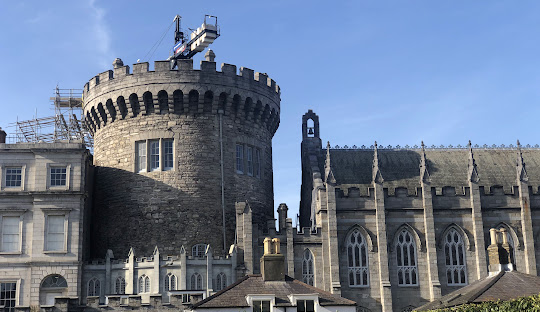
The Etymology of Dublin: A Tale of Two Settlements and a "Black Pool"
Posted by Webjuice SEO Agency in Dublin on
The name Dublin originates from the Middle Irish term Du(i)blind, meaning "Blackpool." This name derives from the words dubh, meaning "black" or "dark," and linn, meaning "pool." The term referred to a dark tidal pool located near the castle gardens at Dublin Castle, where the River Poddle flowed into the River Liffey. Over time, Du(i)bhlinn evolved into the Early Modern Irish form Duílinn, pronounced [ˈd̪ˠiːlʲin̠ʲ] in the local dialect.
In Gaelic script, scribes represented the sound "bh" with a dotted "b," spelling the name as Du(i)ḃlinn. However, those unfamiliar with Irish omitted the dot, leading to the modern anglicized name, Dublin. The Middle Irish pronunciation influenced the city’s name in other languages, including Old English (Difelin), Old Norse (Dyflin), and modern Icelandic (Dyflinn). Variations also appear in Welsh (Dulyn) and Breton (Dulenn). Similar names exist in other parts of Ireland, such as Devlin, Divlin, and Difflin, as well as in Gaelic-speaking areas of Scotland, including An Linne Dhubh ("the black pool") near Loch Linnhe.
It is now believed that the Viking settlement of Dyflin, established around 841, was preceded by a Christian ecclesiastical site called Duibhlinn, from which the Viking name originated. During the 9th and 10th centuries, two distinct settlements existed where modern Dublin stands: the Viking Dyflin and a Gaelic settlement named Áth Cliath, meaning "ford of hurdles."
Áth Cliath refers to a crossing point over the River Liffey near the present-day Father Mathew Bridge, historically known as Dublin Bridge. The term Baile Átha Cliath, meaning "town of the hurdled ford," became the city’s common name in Modern Irish. This name is often shortened to Bleá Cliath in casual speech.
Baile Átha Cliath was also the site of an early Christian monastery near Aungier Street, now home to Whitefriar Street Carmelite Church. Interestingly, other places share the name Áth Cliath, such as Àth Cliath in East Ayrshire, Scotland, known in English as Hurlford.
Dublin’s rich etymological history reflects its dual heritage of Gaelic culture and Viking influence, which continues to shape its identity as Ireland’s vibrant capital.